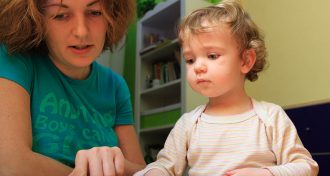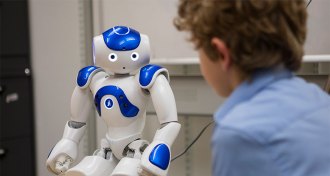Psychology
-
 Animals
Animals‘Mama’s Last Hug’ showcases the emotional lives of animals
In ‘Mama’s Last Hug,’ Frans de Waal argues that emotions occur throughout the animal world.
By Erin Wayman -
 Psychology
PsychologySTEM professors’ beliefs on intelligence may widen the racial achievement gap
Seeing intelligence as fixed can result in lower grades, especially for certain minorities
By Bruce Bower -
 Humans
HumansWhy it’s key to identify preschoolers with anxiety and depression
With mounting evidence that very young children can experience anxiety and depression, efforts are underway to identify and treat them early.
By Sujata Gupta -
 Psychology
PsychologyEasing test anxiety boosts low-income students’ biology grades
Wealthier students outperform their less advantaged peers in math and science. Decreasing test anxiety may help even the playing field.
By Sujata Gupta -
 Psychology
PsychologySometimes a failure to replicate a study isn’t a failure at all
Ego depletion is one of the most well-known concepts in social psychology. A recent study can’t confirm an old one showing it exists. Who is right? Probably everyone.
-
 Psychology
PsychologyShahzeen Attari explores the psychology of saving the planet
Merging psychology with engineering, Shahzeen Attari probes how people think about conservation, energy use and climate change.
By Bruce Bower -
 Psychology
PsychologyHuge ‘word gap’ holding back low-income children may not exist after all
The claim that poor children hear fewer words than kids from higher-income families faces a challenge.
By Bruce Bower -
 Psychology
Psychology‘Replication crisis’ spurs reforms in how science studies are done
Redos of social sciences studies from major journals point to opportunities for improvement.
By Bruce Bower -
 Tech
TechChildren may be especially vulnerable to peer pressure from robots
Elementary school children often endorsed unanimous but inaccurate judgments made by small groups of robots.
By Bruce Bower -
 Psychology
PsychologyKids today are waiting longer than ever in the classic marshmallow test
Preschoolers wait longer for extra treats than they used to. What does it mean?
By Bruce Bower -
 Neuroscience
NeuroscienceSplitting families may end, but migrant kids’ trauma needs to be studied
The long-term effects of separating children from their parents at the U.S. border need to be studied, scientists say.
-
 Psychology
PsychologyPhone apps are helping scientists track suicidal thoughts in real time
Researchers are using smartphones to tap into the ups and downs of suicidal thinking that occur over hours and days, hoping to help prevent suicides.
By Bruce Bower